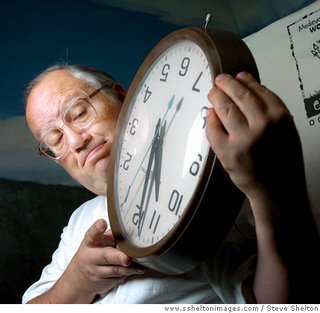
John de Graaf gave a wonderful talk packed with unconventional wisdom! John is a writer, editor and filmmaker who put together the seminal film, "Affluenza." Here are Paul's notes from his talk:
"Everybody always thinks you have to have PowerPoint slides with a talk. But a friend of mine said, 'Power corrupts. PowerPoint corrupts absolutely.' So I use a flip chart."
John asked which country is most productive if you gauge efficiency, that is, output per hours worked. Various guesses, but the answer was a surprising one: France. No wonder they have time for the great wine and food! The U.S. always ranks at the top of "productivity" ratings, but that's because statistically we use total output on annual basis. If you measure total output per hour worked, France is No. 1.
In 1970 Europeans worked slightly more hours per year than Americans. But today they work about 80 pct as much, 9 weeks less than the average American. That includes vacations, shorter work weeks and so on. Yet Europeans are still 70 pct as productive on an annual basis, and the actual number is closer to 80 percent when you figure in Americans spending 8 percent more than Euros of their GDP on health care, for worse results!
American health improved since 1970 a little bit. But in 1970 the U.S. was in the middle of developed countries in health. Today WHO puts us at 37th, based on longevity, infant mortality, tests of fitness, chronic illness.
British health contrasted with American health: A study done by British Health Services and National Institutes of Health was shocking: That after 55, Americans are twice as likely to have chronic illness, diabetes, hypertension, heart disease. Poverty-level Brits were as healthy or healthier than rich Americans. Rich Americans are supposed to get good health care. Yet their care is much poorer than rich Brits and about the same as poor Brits.
Why?
Stress? Obesity? No, diet not it. Brits consume more fats, more sugars. Exercise another expected factor, but not it.
More significant: Gap between rich and poor. Class differences. They do contribute.
But the biggest factor is socializing, time spent with others. Americans are increasingly lonely; 1 in 4 have no close friends, majority have at most 2 friends.
Another factor, security: Saving has dropped below zero for first time since 1933. Euros save 11-12 pct. by comparison.
U.S. steadily increased our quality of life to 1973-4. Since then, a steady decline.
Euros have 1/2 the ecological footprint of Americans. In other consumption areas, they consume only 1/2 of what we put out.
John put forth a six-point plan to get back on path:
1. Paid child leave. Only 4 countries don't have: Lesotho, Swaziland, Papua New Guinea and yes, the U.S. Those are the only countries in entire world that don't understand it's important for parents to bond with small children. Lacking parental leave creates more problems with child health, juvenile delinquency. Canadians give 1 full year of paid family leave, 55 percent of salary for either parent.
2. Sick leave. U.S. is only industrial country in world that does not guarantee sick leave. What happens is that Americans go to work sick. They make other people sick. That increases the strain on health care. Americans pay twice as much for health care, $7k per person a year. Despite all that spending, U.S. ranks at very bottom in terms of health. We're just doing things that lead us to be less healthy.
3. Paid vacation. We believe Americans deserve at least 3 weeks paid vacation. In Euro it's 4 weeks base minimum. Americans don't even feel like they can take the vacation they earn. This year 40 percent took 1 week or less vacation, despite the threat of losing earned vacation time if they didn't take it. And then, 25 percent of Americans get no paid vacation.
4. Limits on compulsory overtime. The only state to do it: Maine, 80 hours week maximum. For most industrial countries, the limit is 48 hours. They understand that after 48 it's a hazard to health. You can voluntarily work longer, but it's not compulsory.
5. Parity in hourly salary for part-time workers. Pro-rated benefits and keep health care.
6. Parental support. My new film, The Motherhood Manifesto, brings to light many of the issues. If things change next Tuesday (Paul's note: They did!) there may be action at state and federal level to bring some of these issues to discourse and legislative level.
Barack Obama: I've had chance to work with his staff and talk with him on work-life balance issues and am excited a political leader would say something like this: We live in a culture that discourages empathy...those in power encourage selfish impulses... don't listen to this! Advice: Take risks. Instead of going down the corporate path, Obama took a job helping displaced steelworkers Chicago in the '80s. Don't just go for big bucks. It will leave you unfulfilled.
Each day it seems thousands of Americans are going about daily rounds...coming to realization something is missing. Deciding that work, possessions, diversions, sheer busy-ness are not enough.
We need to give people the opportunity to choose. To live more sustainably, more responsibly, more securely.
Unemployment rates in Europe are constantly raised as a comparison: 9, 10 pct France and Germany. But in many other countries, much lower rates than U.S. We don't take into account 2.1M in our society, way more in our society than others, behind bars. We incarcerate large numbers of our population that in other countries would live on the dole or welfare.
We're told these countries can't be competitive, their economies are failing. I dare anyone to go to Europe and see if people are suffering or deprived. I just returned from 4 weeks. In the Davos forum each year they judge countries in terms of competitiveness, and the U.S. does really well. Last year it ranked No. 2 as competitive economy, which shows you can do it our way, privatize, slash taxes, programs for poor. But the question is, do you have to do that? When you look at Top 10, almost all are Northern European, top 5, most competitive is Finland, with the smallest gap between rich and poor. Sweden, Denmark, Norway, all have good social safety nets and programs. We just need to think differently about all this.
Al Runte asked: You hear from critics of Europe that birth rates are falling precipitously and Euros having to bring in guest workers. Their populations are small, homogeneous, etc. When I talk about the beauty of rail systems in Euro, they say yes but they're about to buy the farm. What do you say?
John: They're way more globalized than we are, they have to make products to sell globally because they don't have big domestic market. On issue of birth rates, this is a complicated one. I hear from Euros it probably will have to change, right now they have a much lower retirement age, in the Netherlands it's common to retire at 55, and I think they understand they may need to work longer, but they are healthier and can work longer, to sustain things.
People say a declining population or lower birth rate will be a disaster because of fewer people to take care of people older than them. What they don't take into account is less pressure on housing, commerce, other things, so prices come down. We need to be smarter about how we study this.
Two stories from Europe:
Staying with professor in Amsterdam who had just interviewed an H-P manager who'd come 2 years earlier to take over the Dutch branch of H-P, and asked do you notice difference between work issues? H-P guy said, yes. Shortly after arriving he'd picked up phone on weekend to get a big shipment out Moday, he'd called secretary, she said excuse me sir I don't work on weeknds and don't expect to be called at home when not working. He told her to compete in global economy, we really need it, and added, we don't appreciate people who aren't team players.
She said OK, but I need to remind you, because of overtime & unscheduled work you need to pay me double time because that's Dutch law. I can do it but I'm a team player, and I know if I call these other people they're gonna be mad at me. So what I'd suggest is you cool your jets, come in Monday morning, we'll get the shipment out Monday morning.
They came in Monday morning, got shipment out. And the H-P guy told me, Now even I have a life. I kinda like it that way.
Story Two: I was in Rome last year, guest of US ambassador to World Health & Food organization there, went out to dinner. Started talking about time:
He said in the 3 years I've been in Rome, the Italians have taught me how to live and how to work. The living part is easy, I go home on time, etc. But that wasn't surprising to me, what was surprising is we get more done at work. Because we know we have limits on our time, we really set priorities and get things done. When the work day was open-ended (in U.S.) we spun our wheels.
Slow Life Slow Food voluntary simplicity Cecile Andrews Take Back Your Time green lifestyle Slow Is Beautiful simple living Sleeping Lady

No comments:
Post a Comment